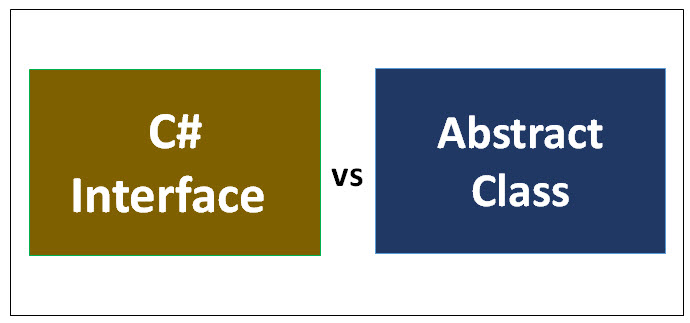Difference Between C# Interface and Abstract Class
C# is an object-oriented programming language used in the .Net framework to develop desktop applications and web applications. It was developed and designed by Microsoft for common language infrastructure. It was first released in the year 2000. In C#, Abstraction is used to hide unnecessary details. It means it will focus on what the object can do rather than how it works. It is used for large and complex programs. Abstract class vs interface C# are used to achieve this. In an abstract class, we can create the functionality and that needs to be implemented by the derived class. The interface allows us to define the functionality or functions but cannot implement that. The derived class extends the interface and implements those functions.
C# language has been developed with a concept to make the programming simple, modern, general-purpose programming language. It also supports the software engineering principles like strong typing, dynamic checking, and garbage collection. In addition, the C# language has strong features like portability, typing, Metaprogramming, Methods and Functions, Property, memory access, polymorphism, LINQ, and functional programming.
C# has a common type system that divides into two parts: Reference type and value type. In C#, boxing is used for converting a value type object to a value of the corresponding reference type. Boxing is Implicit in C#. Unboxing is referred to as converting a value of reference type object into the value of value type. C# requires an explicit type cast for unboxing.
C# provides full support for object-oriented concepts that are Encapsulation, Abstraction, Inheritance, and Polymorphism. In C#, classes are defined that defines the structure of the program and fields. A class is mainly made up of three things that are a name, attributes, and operations. Objects are referred to as instances of classes, which helps in accessing the class’s methods and fields.
In C#, Encapsulation refers to bind the member function and data member into a single class. The class encapsulates the set of methods, properties, and attributes of its functionalities to other classes. In C#, polymorphism can be achieved using method overloading and method overriding. It is also referred to as static polymorphism (Compile-time) and dynamic polymorphism (Runtime). Inheritance is also used to inherit the base class members by a derived class.
Head To Head Comparison Between C# Interface and Abstract Class (Infographics)
Below is the top 6 difference between C# Interface vs Abstract Class.
Key differences between C# Interface and Abstract Class
Both are popular choices in the market; let us discuss some of the major difference:
- In C#, A class inherits one or more interfaces. But a class can inherit only one abstract class.
- In C#, An interface cannot have the constructor declaration. An abstract class can have a constructor declaration.
- In C#, an interface is used to define the outer abilities of a class. An abstract class is used to define a class’s actual identity, and it is used as the object or the same type.
- In C#, an interface is used if various implementations only shared method signatures. An abstract class is used in various implementations are of the same kind and use the same behavior or status.
- In C#, if a new method has been added to the interface, we need to track where all the interface was implemented and add that method. In an abstract class, if a new method has been added, we can add the default implementation, and therefore all the existing code works properly.
C# Interface vs Abstract Class Comparison Table
The primary comparison is discussed below:
| The Basis of comparison |
C# Interface |
C# Abstract Class |
| Access Specifier | In C#, Interface cannot have an access specifier for functions. It is public by default. | In C#, an abstract class can have access to a specifier for functions. |
| Implementation | In C#, an interface can only have a signature, not the implementation. | An abstract class can provide a complete implementation. |
| Speed | The interface is comparatively slow. | An abstract class is fast. |
| Instantiate | The interface is absolutely abstract and cannot be instantiated. | An abstract class cannot be instantiated. |
| Fields | The interface cannot have fields. | An abstract class can have defined fields and constants. |
| Methods | The interface has only abstract methods. | An abstract class can have non-abstract methods. |
Conclusion
In C#, an Abstract class vs interface C# has been used for data abstraction. An interface is better than an abstract class when multiple classes need to implement the interface. The member of the interface cannot be static. The only complete member of an abstract class can be static.
C# does not support multiple inheritances; interfaces are mainly used to implement the multiple inheritances. As a class can implement more than one interface and only inherit from one abstract class. An interface is mainly used only when we do not require the implementation of methods or functionalities. An abstract class is used when we do require at least a default implementation.
These both C# Interface vs Abstract Class are great object-oriented programming concepts that are used highly in developing applications as per the requirement. It is purely selected by the technical leads with which they are more comfortable and the business requirement. Both are easy to use and simple to learn in any programming language.
Recommended Article
This has been a guide to the top differences between C# Interface vs Abstract Class. Here we also discuss the key differences with infographics and comparison table. You may also have a look at the following articles to learn more –




